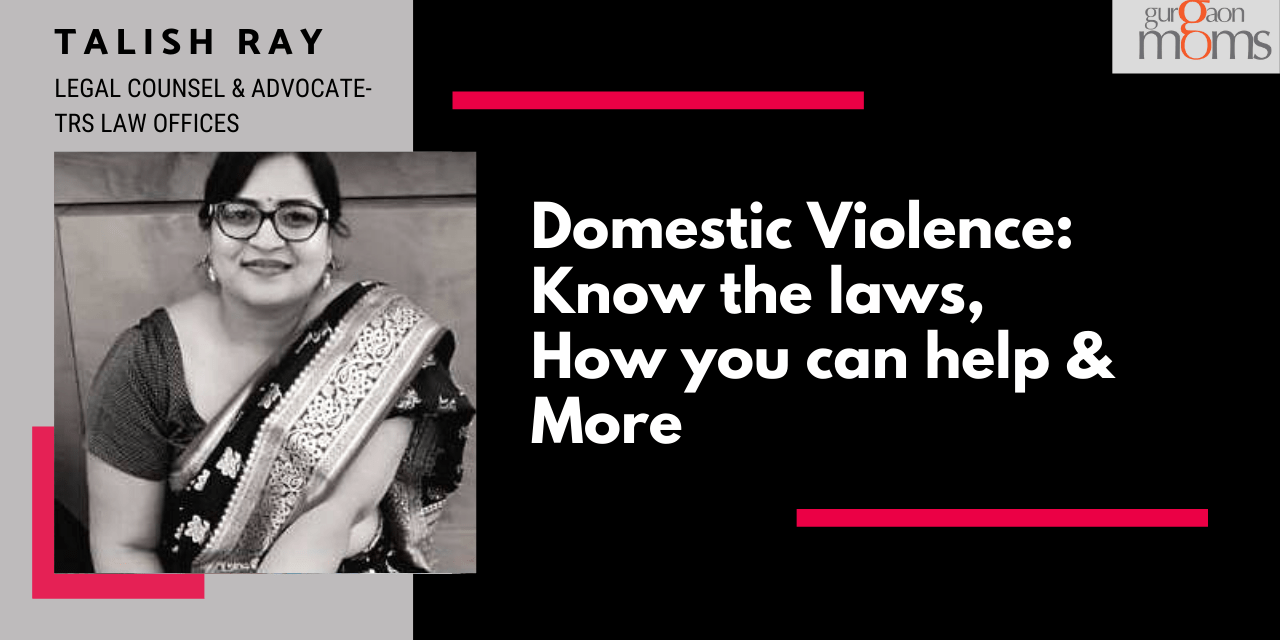Domestic Violence has been prevalent in our country for many years now but unfortunately, the pandemic has resulted in a further increase in cases of domestic abuse the world over. There are many women who suffer silently as they do not have any support or are not aware of their rights or what to do if they are subjected to domestic violence, be it physical, sexual, financial, or emotional
We asked the expert Talish Ray: Legal counsel & Advocate at TRS Law Offices about the Domestic Violence Law in India and what should be done by anyone who is facing abuse.
Whats is the Domestic Violence Act?
The Act protecting women from domestic violence came into force in the year 2005. What women being subjected to domestic abuse mostly want is protection against this abuse. The Domestic Violence Act provides that Protection. One must understand Section 3 of the Act defines the term Domestic Violence. Here is what it says
- Only women are at liberty to seek refuge under this Act.
- The Act seeks to protect women who are either in a live-in relationship with an abusive partner or are married to men who are abusive in nature.
- The Act also has provisions wherein the women who are being subjected to domestic violence can register a case against the husband’s family members who are causing such abuse.
- The Act includes actual abuse or the threat of abuse that is physical, sexual, verbal, emotional, and economic. Harassment by way of unlawful dowry demands to the woman or her relatives would also be covered under this definition.
- The fear of being rendered homeless is a very real fear that many women face. This Act provides for a women’s right to reside in her matrimonial or shared household. This right can be exercised and implemented by a residence order, which is passed by the Court.
If the woman facing domestic abuse is in a domestic relationship with the man , then she has the right to turn to the DV Act
You may also read this : THE PROTECTION OF WOMEN FROM DOMESTIC VIOLENCE ACT, 2005
What is the first step that a woman should take if she is in a troubled marriage? What are her rights as a victim or an aggrieved person?
The Domestic Violence Act is an act that is an emergency measure for protection.So under this act, the woman can get a protection order under any of the subjected abuse -physical, verbal, economic, sexual, emotional. This act provides relief immediately, the court has to pass a protection order within 60 days (that is the maximum time ). However this Act is not about deciding your right, therefore it is the first step that is taken. Accepting the fact that things have gone wrong and how is it that you are going to navigate the journey. A lot of thoughtful planning is involved before you take the first step for filing an application for protection. The application can be filed at the Family Court or you may seek a Protection Officer. The officer visits the aggrieved woman’s home and then files a domestic violence report in the court and the court takes that into cognizance as well.But immediate relief by the court is provided even before this. The aggrieved should have a well-prepared Counsel.
Most women do not seek punishment but a cessation of the violence against them and their dignity to remain intact .
In that sense, an FIR post the filing of the application is an open option . Please treat the Domestic Violence Act as a stop=gap emergency measure thereafter the other steps continue, whether it is FIR or a 498A Case , Divorce ,Guardianship, Custody of your child. The woman should first protect herself and then move on with her journey. The DV Act provides that safety
Does the physical or geographical location of the case matter?
The jurisdiction clause of the Domestic Violence Act states that the case can be filed at either of the 3 locations
- Where the abuse took place
- Where the respondent (abuser) resides
- The temporary /permanent place of residence of the aggrieved
One needs to decide depending on what you are seeking. If it is the right to staying in your matrimonial home, then it should be filed where you are staying with your husband / partner
How can friends, family, neighbours, community embers help a victim of Domestic abuse as at times women do share their plight but do not want the same to be disclosed ?
One should understand that for any protection or legal order to be passed, the aggrieved has to go to court herself. However, it is imperative for them to be empowered before they do that. It needs to be figured out what is it exactly that is stopping them and friends and family can play an important role
- By offering them a non-judgemental view
- By explaining to them the law, again in a non-judgemental way that they should not put up with any kind of domestic abuse. And if they decide to take a step against it, you are there to support them
- Empower them constantly by reiterating the fact that the law stands with them and it is better to raise your voice against abuse so that you are safe & happy. Also not to worry about what will people say “log kya kahenge”.
We all need to understand that marriage is a lifestyle and one has the right to choose to enter into it and to move out of it
Watch the entire conversation below and get answers & advice to more queries
What is a shared household? Has it undergone any change recently?
Yes, shared household has undergone a change. A shared household is any household that you live or may have lived in a domestic relationship and it includes the property of your parents or your in-laws.It ensures that you have a right to stay in that property.
What are the acceptable types of Evidence?
In Physical Abuse, the types of evidence include -medico-legal, photographs, videos shared via WhatsApp too, messages or emails sent to parents informing them about the abuse. It is important to save data for the same to be accepted by the court.
In verbal or emotional abuse audio or video recordings or CCTV footage from the RWA etc can be submitted as evidence.
Please ensure that you secure your device, social medial accounts, bank accounts and don’t share our password with your partner or anyone
Love without Respect is Abuse
What are approximate expenditures and time taken in domestic violence cases ?
It depends. Women can avail of Legal Aid for free from the Legal Aid Cell available in the same courts. The cost of the legal procedure depends on the type of Counsel you hire. It is not an inexpensive process. How much time will the case take again depends on your lawyer and the preparation of the case .
What if the spouse /partner declares bankruptcy refuses to pay up after a court order?
The court will take into account everything and is aware of what goes on and understands the loopholes. Even if the respondent declares bankruptcy, the court and can ask the respondent to start earning, ask his employer to pay, or attach his property/properties. At times they may also order imprisonment if the respondent refuses to obey the order
As moms, how can we educate our children so that these things don’t happen?
- Stop them from getting into a cultural notion of gender. As parents, you need to provide a background where your don’t trat your kids as a gender.
- Teach your daughters to be financially independent
- Teach them that marriage is a lifestyle and not your life
- Teach boys that it is important to give respect and treat all equally, in any relationship
- Drop the raja beta syndrome. Housework is a part of life skills. So teach both your son & daughter to do it
- Remember patriarchy hurts the boys and causes toxic masculinity.
Please keep in mind that the Domestic Violence Act is only a stop-gap arrangement. The aggrieved should to file for other cases depending on what she wants be it divorce or custody.





